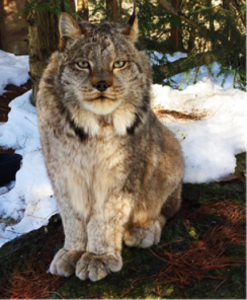April 17, 2018 – Schnecksville, PA: The Lehigh Valley Zoo announced today that an 8-month-old Snowy Owl is on exhibit at the zoo. The owlet making Lehigh Valley its home was part of a clutch of 4 chicks hatched by parents at the Lincoln Park Zoo in Chicago. This little guy is too young to breed and needs somewhere to grow and mature. As part of its commitment to protecting endangered species, the Lehigh Valley Zoo provides a home to animals retired from breeding, or not yet recommended for breeding. While residing at the zoo, the owlet will be monitored to ensure he receives the proper diet and care needed to mature into a healthy adult owl.

Since he is still young, the owlet has black barring across his chest, back and wings. As he ages, the barring will fade to black flecks on primarily white plumage. Females retain the black barring throughout their lives. The owlet enjoys tubs with shaved ice on warm days so watch for him splashing about as the weather heats up this summer.
Sadly, the little owlet does not have a name. Our Zoo Keepers would like the members and guests of the zoo to participate in naming him. There is a box in the front office of the zoo where we are collecting name suggestions. Please stop by in April and May to see the owlet and to submit your entry for the Owlet Naming Contest. The contest winner will get a 2018 zoo prize pack and tickets!
Zoo’s Mission to Protect Endangered Animals
Lehigh Valley Zoo’s mission is to help save species from extinction through animal conservation leadership and to provide guidance in conservation science by celebrating, studying, and protecting wildlife and their habitats. The Snowy Owl is endangered because these owls have a hard time finding enough food. Poachers also kill them to make money from the lovely feathers of this type of owl. Trapping them has resulted in their numbers taking quite a dip in the past couple of decades. “Offering space and expert animal care to this young owlet is another way our zoo participates in the effort to protect this endangered species.” said CEO/President Melissa Borland.
Lehigh Valley Zoo is located at 5150 Game Preserve Road, Schnecksville, PA 18078.
About the Lehigh Valley Zoo:
As a member-supported non-profit organization, Lehigh Valley Zoological Society was founded in 2004, but as a treasured community landmark, the Zoo’s history spans over a century. Founded in 1906 by General Harry C. Trexler, a local industrialist, the Lehigh Valley’s Trexler Game Preserve has educated and entertained more than five million people.
Accredited by the Association of Zoos and Aquariums (AZA), the Lehigh Valley Zoo hosts year-round, family-friendly events and activities, educational programs, and camps. With a mission to create a safe, engaging and enlightening wildlife experience for guests of all ages, the Zoo demonstrates leadership in the cultural, scientific and conservation communities. To learn more about Lehigh Valley Zoo, we invite you to visit our website, www.lvzoo.org, or follow us on Facebook.




 Schnecksville, PA, March 6, 2018: Lehigh Valley Zoo announced that the horrific storm on Friday, March 2nd severely damaged the entrance sign to the Lehigh Valley Zoo. Understandably, it will be costly to replace the sign. The damage comes at an awkward time in the zoo’s plans and finances. The zoo had planned to relocate and redesign the entrance to be ADA accessible by the close of 2018. Spending scarce funds to replace the damaged sign only to relocate the entrance six-nine months later is not a prudent use of resources. “We are disheartened that our sign was destroyed.” Said Melissa Borland, President and CEO of Lehigh Valley Zoo, “On the other hand, it gives us an opportunity to share our long-term goal of creating a disability-friendly entrance. With the community’s help, we hope to accelerate our timeline for relocating our entrance.”
Schnecksville, PA, March 6, 2018: Lehigh Valley Zoo announced that the horrific storm on Friday, March 2nd severely damaged the entrance sign to the Lehigh Valley Zoo. Understandably, it will be costly to replace the sign. The damage comes at an awkward time in the zoo’s plans and finances. The zoo had planned to relocate and redesign the entrance to be ADA accessible by the close of 2018. Spending scarce funds to replace the damaged sign only to relocate the entrance six-nine months later is not a prudent use of resources. “We are disheartened that our sign was destroyed.” Said Melissa Borland, President and CEO of Lehigh Valley Zoo, “On the other hand, it gives us an opportunity to share our long-term goal of creating a disability-friendly entrance. With the community’s help, we hope to accelerate our timeline for relocating our entrance.” The current entrance to the zoo, located at the crest of a steep hill that, although picturesque, is difficult for those with wheelchairs, canes, and strollers to negotiate. To address the obstacles created by the hill, the zoo planned to relocate the entrance to the west side of the zoo in late 2018. The land on west side of the zoo is flat, and an entrance gate at that point of the zoo has visitors entering across from the lively and active North American river otters with its stadium seating. Along with the flat surface which is better for those with mobility challenges, the new entrance provides access for wheelchairs. Additionally, it includes space for a facility for charging and storing mobile scooters for those needing support to traverse the zoo property. An added benefit of the relocated entrance is that it will be safer for those with strollers and toddlers learning to walk. “We want the Lehigh Valley Zoo to be inclusive of all members of our community.” Added Melissa Borland, “This relocation will insure the entrance to the zoo is ADA accessible.”
The current entrance to the zoo, located at the crest of a steep hill that, although picturesque, is difficult for those with wheelchairs, canes, and strollers to negotiate. To address the obstacles created by the hill, the zoo planned to relocate the entrance to the west side of the zoo in late 2018. The land on west side of the zoo is flat, and an entrance gate at that point of the zoo has visitors entering across from the lively and active North American river otters with its stadium seating. Along with the flat surface which is better for those with mobility challenges, the new entrance provides access for wheelchairs. Additionally, it includes space for a facility for charging and storing mobile scooters for those needing support to traverse the zoo property. An added benefit of the relocated entrance is that it will be safer for those with strollers and toddlers learning to walk. “We want the Lehigh Valley Zoo to be inclusive of all members of our community.” Added Melissa Borland, “This relocation will insure the entrance to the zoo is ADA accessible.”










